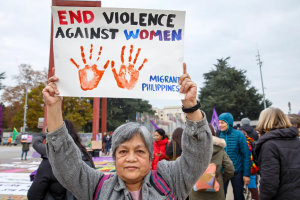By: Christina Bradic
Impunity Watch News Staff Writer
THE HAGUE, The Netherlands – The International Court of Justice (ICJ) ruled on January 31, 2024, that Russia failed to comply with certain requirements of the International Convention for the Suppression of the Financing of Terrorism (ICSFT) when the government failed to investigate terrorist funding going into Ukraine. However, the Court stopped short of a declaration that Russia violated both the ICSFT and the International Convention on the Elimination of All Forms of Racial Discrimination (ICERD). The court also did not order associated prosecutions, as Ukraine requested.
 |
The government of Ukraine brought this case before the ICJ in 2017 based on the 2014 annexation of Crimea and ongoing Russian aggression, including “a multifaceted attack on the people of Ukraine for which the Russian Federation is responsible under international law.” Ukraine’s suit included concerns that, “the Russian Federation has used its control over the Crimean Peninsula to impose a policy of Russian ethnic dominance, pursuing the cultural erasure of non-Russian communities through a systematic and ongoing campaign of discrimination.”
The case against the Russian Federation included evidence of targeted attacks on civilians, systematic oppression of the Crimean Tatar community through banning cultural activities and suppressing its political systems and leaders, and supplying weapons, funding, and training to three pro-Russian terrorist groups in the region, the “Donetsk People’s Republic” (“DPR”), the “Luhansk People’s Republic” (“LPR”), the “Partisans of the Kharkiv People’s Republic” (“Kharkiv Partisans”).
The ICJ voted thirteen to two that the Russian Federation violated Article 2 of the ICFT which bars state conduct where the “purpose of the act, by its nature or context, is to intimidate a population, or to compel a government or an international organization to do or to abstain from doing any act.” The Court also found that Russia violated Article 9 of the ICFT, which states that “upon receiving information that a person who has committed or who is alleged to have committed an offence set forth in article 2 may be present in its territory, the State Party concerned shall take such measures as may be necessary under its domestic law to investigate the facts contained in the information.”
With a vote of ten to five, the Court rejected all other submissions made by Ukraine with respect to the International Convention for the Suppression of the Financing of Terrorism and all submissions made by Ukraine regarding the International Convention on the Elimination of Racial Discrimination.
For further information, please see:



